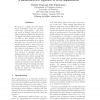Free Online Productivity Tools
i2Speak
i2Symbol
i2OCR
iTex2Img
iWeb2Print
iWeb2Shot
i2Type
iPdf2Split
iPdf2Merge
i2Bopomofo
i2Arabic
i2Style
i2Image
i2PDF
iLatex2Rtf
Sci2ools
NLPRS
2001
Springer
2001
Springer
A Hierarchical EM Approach to Word Segmentation
We propose a simple two-level hierarchical probability model for unsupervised word segmentation. By treating words as strings composed of morphemes/phonemes which are themselves composed of character/phone strings, we use EM to first identify the important morphemes/phonemes in a corpus, and then use a second level of EM to identify words given a lower level morpheme/phoneme segmentation. To further improve performance of the basic method we employ a mutual information criterion to eliminate long word agglomerations and reduce the size of the inferred lexicon while moving EM out of poor local maxima. Experiments on the Brown corpus show that our method accurately recovers hidden word boundaries using less training data than current MDL based approaches, even though our method is only trained on raw unsupervised data.
Level Morpheme/phoneme Segmentation | Natural Language Processing | NLPRS 2001 | Two-level Hierarchical Probability | Unsupervised Word Segmentation |
Related Content
| Added | 30 Jul 2010 |
| Updated | 30 Jul 2010 |
| Type | Conference |
| Year | 2001 |
| Where | NLPRS |
| Authors | Fuchun Peng, Dale Schuurmans |
Comments (0)

